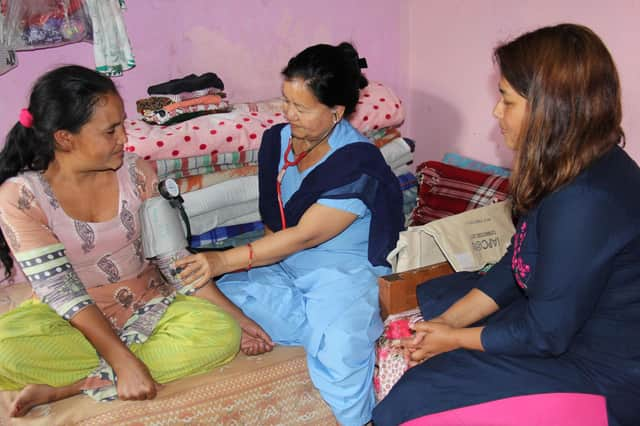Amid Covid squeeze on UK aid budgets, we cannot forget world's poorest – Dr Cathy Ratcliff


We want to move forward together, as a country and a global community. Yet it’s challenging to navigate, as we hear of government cuts and delays necessitated by the financial strain of the pandemic.
Charity EMMS International and our partners in Nepal were planning to launch an innovative palliative-care project to improve services for people with life-limiting illnesses in rural Nepal on July 1.
Advertisement
Hide AdAdvertisement
Hide AdThe squeeze on UK aid budgets means that date has been lost to the uncertainty of Covid-19 We have made the case to the UK government that delays can be as damaging as budget cuts for Scottish charities and the communities we serve.
In our case, patients enrol in a palliative-care service with their families and the family is supported for a year, on average, until the patient dies. Therefore the anticipated delay of nine months means that nearly a year’s worth of families will not benefit from these services.
These families will not get either the pain relief or the poverty reduction that palliative care brings, through helping families not spend vast amounts of money on futile treatments, for example.
Girls will not be helped to stay in school, as many will drop out to do the caring that our project will help adults to do. Palliative care really works to reduce poverty, in a health system where patients’ pathways are not always clear and where families may sell everything to get treatment for their loved one.
This project was conceived of before any of us knew of Covid-19. It responds to healthcare challenges that were present before the pandemic, and which have been exacerbated by it. It addresses the challenges of girls’ access to education that have been multiplied by lockdown school closures.
These delays and cuts affect a number of charities and the communities with whom we are working. EMMS has had to step into the gap this has created for our partner in Nepal, by funding services which would have been put on hold, relying on our own reserves to do so while supporting our partners in their Covid-19 responses.
The harsh reality is that financial consequences and delayed services will have a significant impact on lives for years to come. Our governments are in an unenviable position in the decisions they must make.
However, as a country, Scotland or the UK, our commitment to our global neighbours is not only measured in the budgets we set. Our hope is that delays and uncertainty will not add to the enormous burden faced by the poorest communities.
Advertisement
Hide AdAdvertisement
Hide AdThis is the request we have made to the UK government. We are asking that every effort be made to reduce delays in starting these projects and, in our case, to give some certainty to healthcare workers and families in Nepal who are dealing with the latest coronavirus surge, and whose burden will grow further without more help now.
As government weighs up its priorities, please let’s not forget the world's poorest. We’re not asking for more money. We’re just asking for that money not to be delayed.
Dr Cathy Ratcliff is director of international programmes of EMMS International
A message from the Editor:
Thank you for reading this article. We're more reliant on your support than ever as the shift in consumer habits brought about by coronavirus impacts our advertisers.
If you haven't already, please consider supporting our trusted, fact-checked journalism by taking out a digital subscription.
Comments
Want to join the conversation? Please or to comment on this article.
